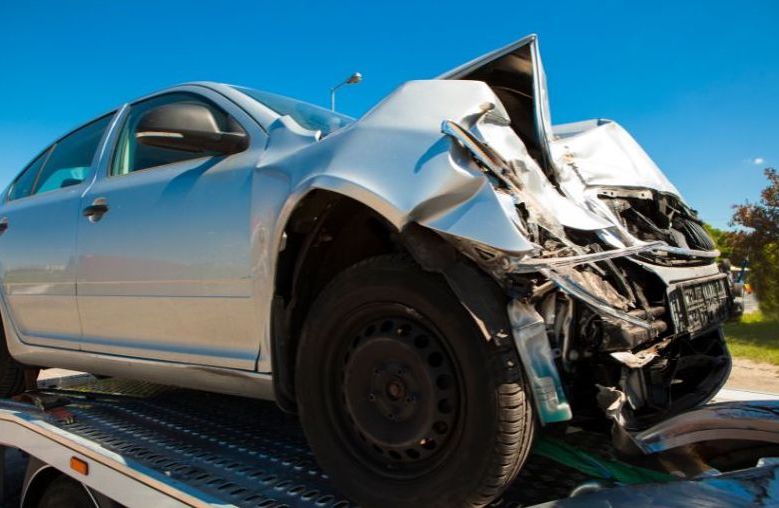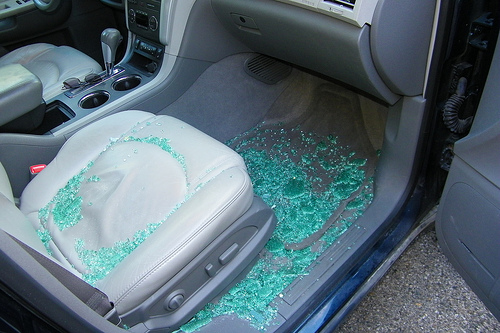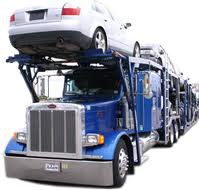
Ever wonder where wrecked cars end up after a crash? After they've been deemed a total loss by the insurance companies, they meet a variety of fates. Cars that are badly damaged after a collision, or natural causes such as hail, are deemed suitable only for the scrapyard, and are promptly turned into scrap and recycled. Other crashed cars may be deemed to be repairable vehicles, despite the fact they were determined to be too costly to fix. These vehicles are, sometimes, bought back from the insurance company by their prior owner and repaired with the money received from the said company. Though these salvaged cars will now carry that title for the rest of their lives, many return to faithful service for their owners
What Happens When a Car Is Totaled?
When a car is declared to be a total loss, this means that the cost of repairing it outweighs the actual value of the vehicle. In such cases, insurance companies may decide to scrap or salvage the car as opposed to repairing it. The majority of these totaled vehicles are stripped for parts before being sent off to be crushed and recycled.
However, each state has different laws and regulations in place when it comes to totaled vehicles, meaning some may still be repaired or even rebuilt. After being restored, these cars could legally obtain a new title and end up back on the road. It's worth noting, however, that not all cars with rebuilt titles will be legal and safe for public use. Therefore, individuals looking to purchase a car with a salvage title should make sure to thoroughly inspect its condition before committing to the purchase.
State Regulations Vary
In an even more concerning practice known as “title-washing," shady individuals sometimes take advantage of state law differences by moving a vehicle with a title indicating it was totaled in one state and obtaining a clean title in another state – effectively removing any trace of its poor condition. This can lead to unsuspecting buyers purchasing flood-damaged cars at face value without ever knowing about the previous damage. Even legitimate dealers may sell rebuilt or salvage cars with significantly reduced prices compared to those of cars with unblemished histories, though these deals come with their own set of risks for risk-averse buyers. State regulations regarding totaled vehicles vary greatly from one state to another, leaving buyers vulnerable to unscrupulous operators. In some states, titles for totaled vehicles clearly label them as “salvage” or “flood” vehicles and provide warning signs that the car is not fit to be driven on public roads. Other states are much less stringent, however, and do not indicate that a vehicle is totaled on its title. This allows property-damaged cars to be sold without the buyer being aware of their poor condition.
In an even more concerning practice known as “title-washing," shady individuals sometimes take advantage of state law differences by moving a vehicle with a title indicating it was totaled in one state and obtaining a clean title in another state – effectively removing any trace of its poor condition. This can lead to unsuspecting buyers purchasing flood-damaged cars at face value without ever knowing about the previous damage. Even legitimate dealers may sell rebuilt or salvage cars with significantly reduced prices compared to those of cars with unblemished histories, though these deals come with their own set of risks for risk-averse buyers.
Some, however, are destined for a second life after shipping overseas. Bought at auctions, usually in bulk, these damaged, but not destroyed, vehicles are bought by companies to be sent overseas to emerging markets.
The Market for Salvaged Cars is Growing in the Middle East
Multiple companies are sending such cars overseas. In some cases, the insurance companies themselves sell vehicles they own to foreign buyers, who will often sell them, still damaged, to buyers in countries with little or no auto rules and regulations. Often, third party companies will buy the vehicles from the insurance companies and resell them at reduced prices to foreign dealerships that will repair and sell the vehicles to the public.
The demand for repairable salvage cars is growing, especially in developing countries like Afghanistan and Iran, where the average worker will never have the money to buy a new car. In many of these countries, there is no indigenous car manufacturer, and large foreign companies, like GM and Toyota, won't recognize a good return on investment, and as such, will not spend much time marketing or importing cars into the region. Other times, government restrictions mean the barriers to entry are difficult or nearly impossible to bypass, leaving car-craving citizens out of luck. In the case of Iran, a supply of salvaged cars must pass through many gray markets to arrive from the United States, as companies that operate in the US are officially banned from trading with the country. These vehicles are often sold by American companies, usually wholesale auction companies, to foreign companies in places like Pakistan, which then repair and resell the vehicle to wholesalers in places like Iran.
The journey of these cars from the US to Afghanistan is a complicated one, and often a great deal of money can be made in the process. The vehicle's condition plays an important role in determining its price and eventual destination. Cars that are still in relatively good condition are usually sent to countries where they can be refurbished, such as India or Pakistan. However, those that are more severely
Afghanistan a Major Market for Damaged Cars
One particularly voracious market for such vehicles has been Afghanistan. Since the Taliban was swept from power in 2001, the demand for automobiles in Afghanistan has risen exponentially. Without a well developed indigenous network, and uncertainty and high risk from foreign brands, the market here is almost exclusively second hand cars from the United States and Europe. Many are damaged and repaired as best they can be by local mechanics, and then sold to local customers. Japanese vehicles are the most common, with the iconic Toyota Corolla being a favorite. This stems from a combination of reliability and price, with parts and labor to fix Japanese vehicles being significantly lower than their American and European counterparts.
So, though the vehicle in which you had your first kiss or drove your kids to school the first time may no longer be with you, you can take a small comfort in knowing that, perhaps, your vehicle is still soldiering on, allowing the opportunity for another driver in a foreign land to have the same opportunities and memories you did in the vehicle.




